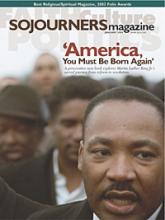The "World Theft Organization," some activists called it. "Pirates of the Caribbean," wrote a Catholic relief group. What did the World Trade Organization meeting in Cancun last September, the second of the last three WTO summits to break up in disarray, do to deserve such words? It let the world’s richest nations, once again, monopolize its agenda and brazenly demand a deal that would hurt the world’s poorest people, particularly farmers. Developing nations and grassroots organizers refused to stand for it, choosing no deal rather than a bad deal.
The coming months are a key time to see whether alliances forged in Cancun will enable fair trade advocates to stand against the Bush administration as, after its WTO setback, it pressures countries one by one to sign onto regional or two-country trade agreements.
The main issue at Cancun was the fate of the developing world’s 2.5 billion peasant farmers. Many of these face ruin because the United States, Europe, and Japan heavily subsidize their own farm sectors, causing them to "dump" products below cost and drive down world prices. (In the United States, much of this subsidy benefits agribusiness corporations rather than small farmers.) Farm subsidies are the opposite of foreign aid—and the developed world now pays itself $320 billion a year in farm subsidies, more than six times as much as it spends on development assistance to poor countries.
Read the Full Article
